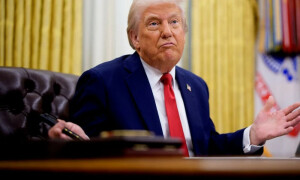In line with its withdrawal on May 8, 2018 from the Iran nuclear deal, the Trump administration has kicked in the first phase of reimposed sanctions on Tehran. US President Donald Trump claims the 'snap back' sanctions are intended to persuade Iran to modify its 'destabilising' and 'malign' behaviour, which according to him includes not only abandoning the pursuit of nuclear weapons (which he claims the nuclear deal did not), stopping missile development (that could threaten Israel and other US allies in the region), and stop its support for 'terrorism'. At the same time, Trump says he is willing to meet Iranian President Hassan Rouhani to negotiate a fresh agreement to replace the 2015 Joint Comprehensive Plan of Action negotiated by Iran and world powers including the US. This 'fresh' agreement gambit comes across as just a ploy to appear reasonable. Not surprisingly, Iran has rejected Washington's 'bullying' and pointed to the US' isolation when China, the largest importer of Iranian oil, Russia, the EU, India and Turkey have all indicated in recent days that they will not accept the sanctions either wholly or at least partially. The real crunch will come when phase two of the US sanctions plan kicks in on November 5, 2018, targeting Iran's oil trade. Whereas the first phase targets Iran's access to dollars and key industries including cars and carpets, the second phase will prohibit importing Iranian oil. Since oil is the Iranian economy's lifeline, the impact already felt by the first phase sanctions on Iran's currency the rial, which has lost half its value since Trump's public hostility, will be exacerbated to crisis proportions. Despite the looming threat of economic meltdown, Tehran remains defiant, counting on sanctions busting by the dissident powers to Trump's unilateralism. In particular, the EU has expressed its regret at the re-imposition of sanctions and vowed, in defiance of threatening noises from Washington, to protect its businesses engaging with Iran. Despite these brave words, however, the fact remains that about 100 international firms are contemplating abandoning Iran for fear of the 'consequences' Trump has threatened all who defy Washington's writ with.
There is no denying the fact that the sanctions will have a significant impact on the Iranian economy amidst already emerging unrest and protests over economic and political issues. In coming out in 'defence' of the Iranian protestors and lambasting Tehran for its alleged repression, Washington has inadvertently let the cat out of the bag. Although the Trump 'get tough, then negotiate' approach resembles recent US policy towards North Korea, there may be significant differences between the two cases. Whereas North Korea is already a declared nuclear weapons power with deadly delivery systems, Iran is nowhere near putting together a nuclear weapon, let alone in a position to deliver it. Iran's nuclear development programme shared with other countries in recent years, including Pakistan, a defensive thrust against hostile neighbours. Tehran hammered out the nuclear restraint 2015 agreement with the world's leading powers in exchange for lifting of crippling economic sanctions. Trump's unilateralism has ignored the protests of the UN, EU and many countries that Tehran is fulfilling its obligations under the pact. If Trump nevertheless decides to go out on a unilateral limb, there must be more to it than meets the eye. In essence, Washington is alarmed by Iran's growing role and influence in the Middle East. In particular, Iran's role in helping Syria's Bashar al Assad to win the war against US and western-backed terrorist groups has put it beyond the pale in Washington's eyes. Its denials notwithstanding, the US' policy towards Iran is precisely to weaken the regime in Tehran through crippling economic sanctions so as to create unrest within and opportunities for subversion from without in order to overthrow the present order. Pakistan not only is Iran's neighbour, it shares religious, cultural and historical ties with it. In economic terms, the Iran-Pakistan frozen gas pipeline is a project worth pursuing, particularly since the EU's ambassador in Pakistan has assured prime minister-in-waiting Imran Khan that the EU has no objections to Pakistan completing its end of the stalled project. However, this may be easier said than done, especially since despite its opposition to US sanctions, the EU is hard put to it to protect its own interests in the face of the US juggernaut rolling inexorably to crush the regime in Tehran. Whatever the outcome of the US-Iran confrontation, Pakistan will have to play its diplomatic cards deftly to balance its interests between Washington and Tehran, contradictory as these might appear to be.
BR100
12,239
Decreased By
-154.2 (-1.24%)
BR30
36,393
Decreased By
-714.3 (-1.92%)
KSE100
114,153
Decreased By
-1379.3 (-1.19%)
KSE30
35,200
Decreased By
-461.3 (-1.29%)





















Comments
Comments are closed.